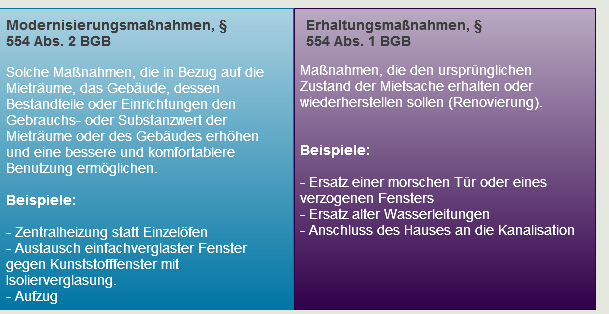Federal Court of Justice, 02.03.2011, Ref.: VIII ZR 164/10
Pursuant to Section 554 (1) BGB, the tenant must tolerate measures that are necessary to maintain the rented property (maintenance measures). These measures include, in particular, maintenance and repairs, cosmetic repairs, but also work of a preventative nature or necessary preparatory measures.
§ Section 554 (2), (3) BGB concerns measures to improve the rented property. According to the judicial definition, modernisation measures are all structural changes to the rented property that increase the utility value within the scope of their purpose and enable better use.
The landlord must inform the tenant in text form of the type, expected scope and start, expected duration and the expected rent increase at least 3 months before the start of the modernisation measures in accordance with Section 554 (3) BGB.
Pursuant to Section 559 (1) BGB, the landlord can then increase the rent after modernisation measures have been carried out.
Modernisation measures must be distinguished in particular from maintenance measures relating to the rental property, as maintenance measures are not apportionable and must therefore be borne by the landlord.
In the above-mentioned decision, the BGH had to decide whether the landlord may increase the rent after modernisation measures have been carried out, even though he had not previously announced the modernisation measures.
FactsThe defendant was the tenant of one of the plaintiff's flats. In September 2007, the plaintiff notified the defendant of the installation of a lift as a modernisation measure.
The defendant objected to this measure, whereupon the plaintiff withdrew the modernisation announcement. The modernisation measures were nevertheless carried out.
Due to the improvement of the rental property, the plaintiff claimed an increase in the monthly net rent in accordance with § 559 BGB, the defendant did not pay.
The district court dismissed the subsequent action for payment of the increase. The regional court amended the judgement of the court of first instance and upheld the claim. With the appeal allowed by the Court of Appeal, the defendant continued to pursue its claim for dismissal.
Federal Court of JusticeThe BGH also followed the plaintiff's opinion. The plaintiff's claim to payment of the remaining rent for the months of June to August 2009 was justified because the rent increase implemented in accordance with Section 559 BGB was effective.
It is often argued in case law and literature that a proper notice of modernisation is an indispensable prerequisite for a subsequent rent increase, because only then is the tenant obliged to tolerate it.
However, a modernisation announcement had not been made here because the plaintiff had withdrawn the announcement initially made and therefore had to be treated as if it had never been declared.
However, a distinction must be made between the tenant's obligation to tolerate the modernisation on the one hand and the obligation to pay an increased rent after the modernisation has been carried out on the other.
The duty to tolerate only serves to enable the actual implementation of the measures; work in the tenant's flat can only be enforced against the tenant's will if there is a duty to tolerate.
The sole purpose of the modernisation notification is therefore to protect the tenant when modernisation work is carried out, but not to restrict the landlord's authority to pass on the modernisation costs to the tenant.
This applies not only in the case of late notification of modernisation, but also if no such notification was made at all.
The question of whether the rent increase could only take effect with the extended deadline of Section 559b (2) sentence 2 BGB in the absence of an announcement did not need to be decided because the plaintiff did not assert it for an earlier date.
The rent increase was also justified according to § 559 BGB. The installation of a lift objectively increases the utility value of the defendant's flat because it is easier to reach, also with regard to the transport of shopping and other loads.
This is not contradicted by the fact that by using the lift, the defendant only saves about half of the stairs that she would have to climb to reach her flat on the second floor. The rent increase also does not constitute an unreasonable hardship for the defendant.
Source: Federal Court of Justice
Important Note: The content of this article has been prepared to the best of our knowledge and belief. However, due to the complexity and constant evolution of the subject matter, we must exclude liability and warranty. Important Notice: The content of this article has been created to the best of our knowledge and understanding. However, due to the complexity and constant changes in the subject matter, we must exclude any liability and warranty.
If you need legal advice, feel free to call us at 0221 – 80187670 or email us at info@mth-partner.de.
Lawyers in Cologne advise and represent clients in tenancy law.





One Response
"The installation of a lift objectively increases the utility value of the defendant's apartment...." - That's true! In my eyes, filing a lawsuit here was pointless from the outset!